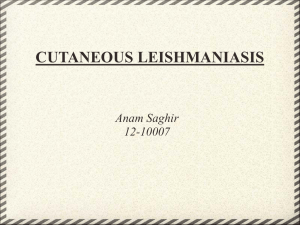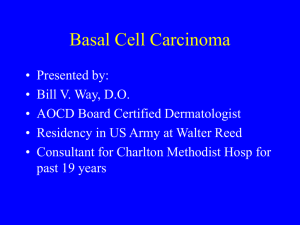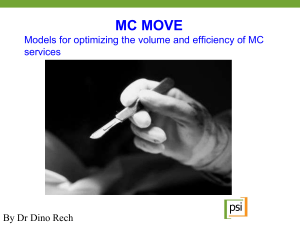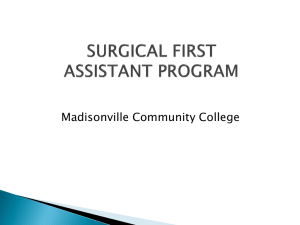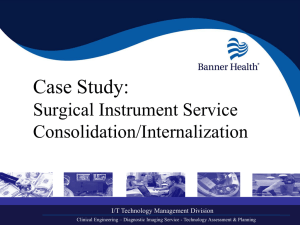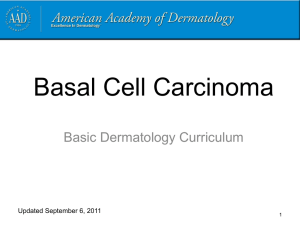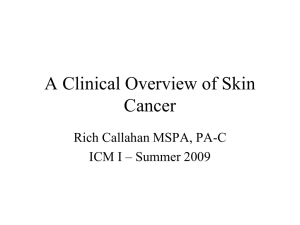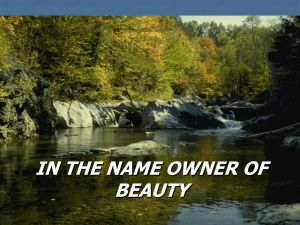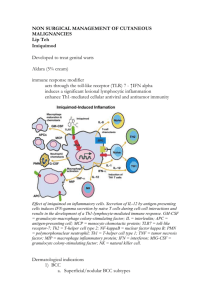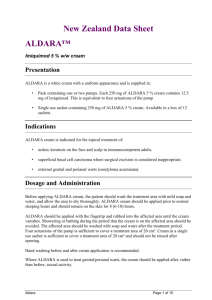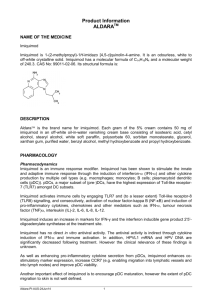Mr Crabbe`s presentation
advertisement
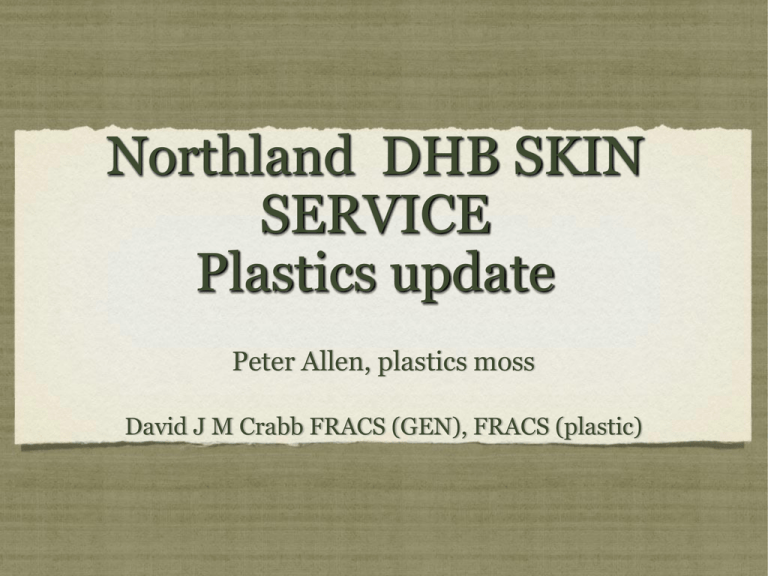
Northland DHB SKIN SERVICE Plastics update Peter Allen, plastics moss David J M Crabb FRACS (GEN), FRACS (plastic) The DHB SKIN SERVICE Plastic section Nested within general surgery Primary triage Peter Allen Secondary triage D. Crabb supported by Clinic staff, Pathway coordinator General surgery, Gypsy service network, combined clinics with Opthalmology and TBA with ENT. Introduction non surgical treatment of skin cancer The Hutt DHB Plastics visual scale Non Melanomatous lesions categorizes the clinical picture at glance includes full spectrum of progression useful tool to decide approach helpful to decide surgery/topical combined with photo, biopsy ,growth rate The clinical Picture Is mixed Presenting lesion with background of many others Deciding which are surgical? Which are non surgical? The borderline digital palpation Thickened lesion implies dermal invasion Ulceration Failure to respond Beware the Morphoeic BCC exception, scarring feels flat Biopsy, biopsy, biopsy Problem can be staged Progression and evolvement is non linear Background photo-ageing Ephemeral solar keratosis, comes and goes in various places Persisting solar keratosis, waxes and wanes in same place progresses to established lesion, such as superficial BCC but may be SCC or more aggressive lesion Irradiation damage UV+UVB Total life time dose in exposed areas, about 100,000hrs graduated change over life course Accelerates in older age Made worse by suppressed or impaired immunity Related to genetics of skin type and evolutionary biology Biological Anthropology all Humans migrating from Africa were black, 65,000 yrs Migration behind melting ice sheets required adaptation to lower northern light levels skin becomes whiter/lighter and thinner Allows penetration of available light for Vit D synthesis Nature very precisely calibrates the skin, thickness and color Optimised for Vit D production without collateral damage 36 degree latitude is same as southern spain or northern morocco stem cells in dermal base have 5 different enzymes to repair fragmented nucleic acids Dendritic cells that mediate immunity have large target nuclei, vulnerable Treatment Principles Require reduced irradiation into dermis equivalent to (pureblood) maori skin pair/restoration assistance to dendritic and stem cell population assisted apoptosis of abnormal cell population treat the whole problem Treatment A screening cream with equivalent protection to Maori skin addition of anti oxidants into cream to assist self repair by damaged cells to assist Stem cells for cell replacement and Dendtritic cell for cell monitoring/tagging Result Clears ephemeral solar keratoses dampens cellular background activity Assists Dendritic cell role in Apoptosis When combined with seasonal therapeutic creams (Effudix/Aldara) will dramatically reduce frequent flyers seasonal Treatment My practice winter 5 flurouracil to treat background ephemeral and some persisting solar keratoses, 3 pulsed cycles Atumn check repose, identify non responders, surgical propositions Summer then escalate Aldara / cryotherapy winter back to 5FU if needed spring check up prior to aldara/screening cream, surgical propositions Seasonal topical treatment cycle Winter Winter topical, 5 Fluorouracil given in pulsed mode 3 to 4 cycles With Hydrocortisone 1% in rest periods Ideal for the multiple persisting solar keratotic background activity Hutt stage 1 and above will be present in all lesions as a background to the presenting lesion Patient is often motivated to act on prevention after surgical episode 1 Seasonal topical treatment cycle Atumn Persisting solar keratosis if it is non responsive to 5FU (suitable Hutt 1 and 2, not all may respond) will need Aldara or cryotherapy Aldara ideal for early lesions including Hutt 3 superficial BCC Suitable for up to 6 lesions, otherwise systemic effect 5 weeks, 5 days and then stop, pm application combined with Am screening cream Seasonal topical treatment cycle summer Superficial BCC with little infiltration should respond To Aldara but may not Adjacant Hutt 1 and 2 will go with Effudix Cryotherapy about the same effectiveness to Aldara Good for scalp and non facial area often more convienant than topical ie shorter White scar on face If not effective first time unlikely second will do Surgery for non responders 3 Surgical reconstructive treatment All incomplete removals come forward to frozen section all prior surgery and scar must be removed F/S control for all margins and then immediate or delayed reconstruction Same for significant primary tumours involving sensitive structures in the face Perineurial invasion on SCC treated as Melanoma Reconstructive surgery is often but not always staged Avoiding the unescessary escalation Fat grafting for subcutaeous contour regeneration additional toolbox in staged reconstruction two flap nose and cheek extensive BCC fat grafting compensates for loss of cheek sub cutaneous volume frozen section clearance Recontruction often multi staged with large step escalation small lesions can be much large defects with lining often need tissue expansion larger on Frozen Section where do we start first consult body check background activity history of lesions/prior surgery/recurrence get your fingers on it surgical propositions first Screening cream with anti oxidant will calm and treat S/K Aldara for 6 worst non surgical ones/repeat Cryotherapy about equivalent to Aldara but white mark Effudix given early if needed or delayed to winter summary, treat the entire problem Early lesions need management train the patient to self manage A stitch in time saves 9 biopsy is a wonderful operation if you cant get it all don't try it might need a really big hole Multiple biopsies give useful information If in doubt always skin graft as local tissue is precious Thank you for your attention Best of luck its a big problem
